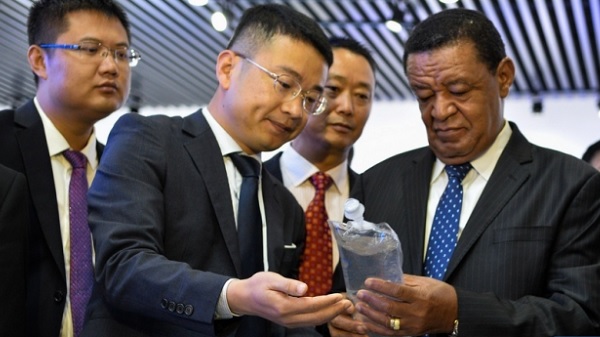
The president visited Eastern Industrial Zone, located in the town of Dukem, which is one of the earliest industryl zones in the country and is 100% Chinese-owned, developed and operated by Qiyuan Group
By Dinah Matengo (CGTN Africa)
Ethiopian President Mulatu Teshome, PhD, has hailed Chinese investment as one that plays an indispensable role in the East African country’s industrialization drive.
Speaking after visiting the Chinese built Eastern Industrial Zone, President Mulatu said the complex, which has more than 80 factories in it, is a showcase in how with right management and planning Ethiopia’s transition from an agriculture-based economy into an industrial powerhouse in the next 10 years can be successful.
The Eastern Industrial Zone, inaugurated in 2010, is Ethiopia’s first industry zone that inspired the Ethiopian government towards establishing more industry parks across the country towards becoming the manufacturing hub of the African continent.
“A decade ago the land the Eastern Industry Zone currently lies on was just an agricultural land, but with hard work it has become today a showcase of high quality industrial factories in sectors such as pharmaceuticals, pulp and textile,” said President Mulatu.
“I hope our local entrepreneurs will learn from the success of Eastern Industry Zone and take this opportunity to enter into the manufacturing sector,” he further said.
Chinese Ambassador to Ethiopia Tan Jian, who accompanied the Ethiopian president in his visit to the Eastern Industry Zone, said the bilateral relationship can be a model of South-South cooperation.
Ethiopia has the biggest economy in the East African region and the second largest population in Africa with around 100 million people, he said.
In that regard, China’s cooperation with Ethiopia can be seen as a model for China-Africa and South-South cooperation, Tan told Xinhua.
Chinese investment and expertise have been crucial to build a 4 billion U.S. dollars 756 km electrified rail line from Addis Ababa to Djibouti, helping ease the bottleneck for landlocked Ethiopia and assisting the East African country maintain its double-digit economic growth over the last decade, said Tan.
Ethiopia-China partnership can be strengthened, be it infrastructure development sector, industrial park development, agricultural sector development and human resource development, said Tan.
“As part of our multi-faceted cooperation every year we provide 400 scholarships to Ethiopians, as we see human resource development is very important for our bilateral partnership,” said Tan.
About Eastern Industrial Zone
The Eastern Industry Zone is Located is located in Dukem, Oromia Regional State, around 30 kilometers south-east of the capital, Addis Ababa, the original plan was to establish a 5 square-kilometer zone operated by the Yonggang Group and the Qiyuan Group, which in five years would entice eighty separate investment projects, creating 20,000 jobs. However, the Yonggang Group soon abandoned the project and the zone currently consists of an area of 2 square-kilometer, a downsizing of over 50%. Like most other Chinese special economic zones in Africa, the Ethiopian zone is 100% Chinese-owned, developed and operated by the aforementioned Qiyuan Group, a China-based privately owned steel manufacturer. In addition to the provision of land at an extremely favorable rate—one Ethiopian birr per square-meter per year for 99 years—the Ethiopian government has also agreed to provide all the necessary infrastructure outside the zone and to cover the cost of 30% of the internal infrastructure.[Ref.: Giannecchini P. and & Taylor I. (2018). The eastern industrial zone in Ethiopia: Catalyst for development? Geoforum, 88, 28-35.]
Source: CGTN Africa
